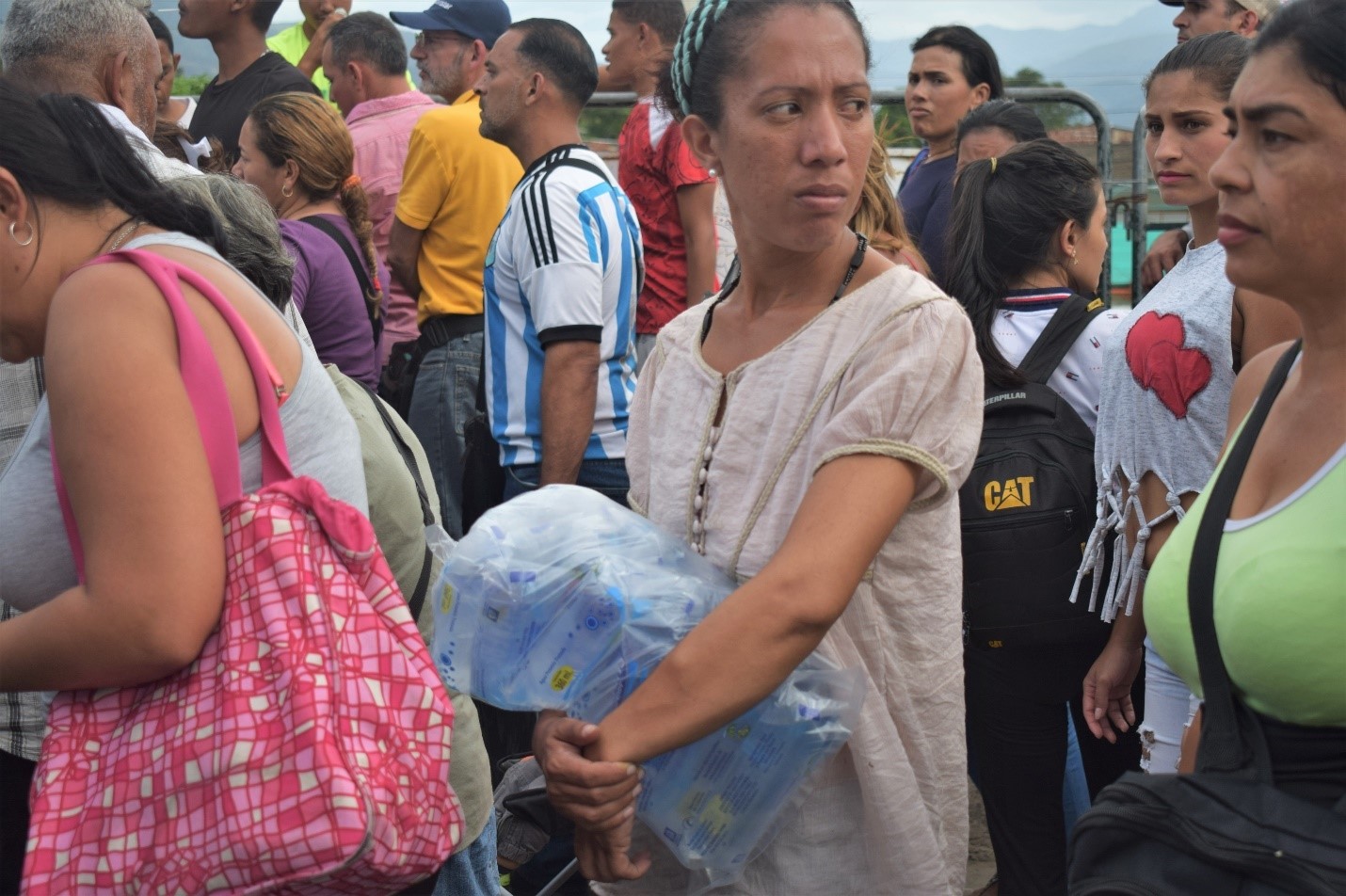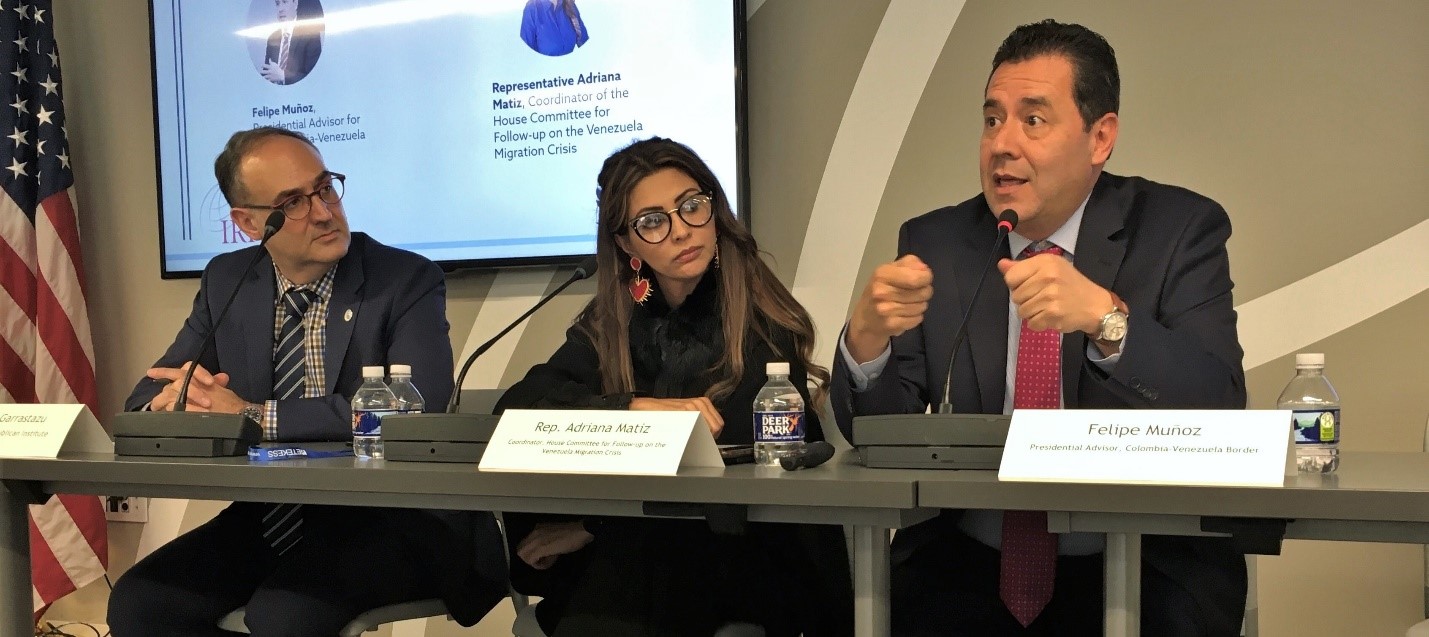
As Colombia continues efforts to end its own 50-year internal conflict, it has been hit with a mass migrant influx from neighboring Venezuela, under the thumb of Nicolas Maduro’s authoritarian regime. Colombia’s humanitarian response to this latest crisis and its long-term peace and security rest on the resilience of its democratic institutions. The International Republican Institute (IRI) programming is helping Colombian lawmakers address the country’s post-conflict challenges and connect citizens with government officials at all levels.
Colombia is at a critical stage of implementing an end to a five-decade internal conflict. What started as a small rural insurgency in the 1960s turned into a full-blown war between main leftist rebel groups — the Revolutionary Armed Forces of Colombia or FARC and the National Liberation Army or ELN — and right-wing paramilitary vigilantes. In the late 1990s, the 22,000-member-strong FARC and the 3,500-member ELN were in control of about two-thirds of the countryside. They marauded villages, blew up oil pipelines, kidnapped and killed farmers and mayors, seized property and trafficked drugs.
Then came Plan Colombia, a joint Colombian-U.S. program begun in 2000 under President Andrés Pastrana to take back guerrilla territory and reduce narcotics production. President Alvaro Uribe gave it teeth by professionalizing and expanding Colombia’s security forces. In 2005, he negotiated a pact to demobilize the paramilitaries. By the time Uribe left office in 2010, the government had brought down most of FARC’s top leaders, and the group gradually lost membership and operational strength. In 2016, his successor, Juan Manuel Santos, was able to negotiate a peace agreement with a much weakened FARC. It was supposed to be an end to a conflict in which 220,000 people died and 7.7 million were internally displaced.
The FARC handed over its weapons to a United Nations verification mission. The rebel group also transformed itself into a political party, with a guaranteed 10 congressional seats until 2026. However, not all FARC combatants demobilized. The transitional justice system set up to identify responsibility for war crimes became mired in political disputes while a peace deal with the rival ELN foundered. Most troubling of all, the overarching goal of extending state presence into the country’s vast rural countryside has yet to gain traction. In this vacuum, illegal groups from the ELN to Mexican cartels and paramilitary vigilantes have rebounded to traffic drugs, gold, arms and gasoline.
Over the backdrop of this incomplete peace, Colombia is now bearing the brunt of succeeding waves of migrants as Venezuela implodes. Between 1.6 and 2 million Venezuelans fleeing political unrest, food insecurity and collapse of the health sector created by Maduro’s misrule have already settled in Colombia since 2015. Today’s arrivals cross into Colombia over bridges or trails on foot with little but the clothes on their backs. Many are malnourished.
Speaking at IRI on December 3, the Mayor of Villa del Rosario Pepe Ruiz said that his town of 80,000 on the border with Venezuela has gained 40,000 new residents in the last three years. Bogota Secretary for Social Inclusion Gladys San Miguel said that Colombia’s capital city has spent $30 million to expand educational facilities to meet the influx of Venezuelan children.
The Maduro regime in Venezuela and its allies are mulling ways to undermine Colombia at this vulnerable moment. Venezuela’s support for dissident members of the FARC is growing again based on long-standing fraternal ties. The ELN, once a minor player in Venezuela, now operates in 18 of its 23 states, trafficking drugs, gold and extorting migrants as they leave the country. More worrisome, the ELN actively recruits among poor and jobless Venezuelans in Colombia.
Extending state presence into former conflict zones, meeting citizen needs and investing in rural development are big challenges. That’s why IRI has partnered with the Colombia Congress, the research center Fundación Ideas para la Paz (The Foundation Ideas for Peace) and the government of the United Kingdom to support meetings among Colombian legislators and local mayors, councils, citizens and ex-combatants in 11 post-conflict zones on issues regarding peace implementation. This work builds on IRI’s work pioneering service fairs, helping to introduce government services to vulnerable communities.
In 2019, IRI designed and commissioned qualitative research on Venezuelan migrants entering and passing through Colombia, including focus group discussions and in-depth interviews with migrants, local residents, government authorities and civil society representatives. The resulting report produced practical recommendations to assist the Colombian government’s response as migrants settle in already marginalized communities competing with citizens for employment, housing, services and health care.
Although organizations like IRI are helping Colombian leaders meet local challenges, now is the time for the international community to step up. Colombia is a democracy in need of assistance to manage the humanitarian needs of one of the world’s largest migration crises and stop the return of a rebounding insurgency at home.
